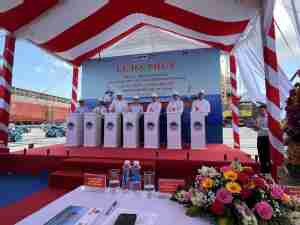To reduce backups of cargo at Port of Long Beach shipping terminals, the Long Beach Board of Harbor Commission voted preliminary approval on Monday, May 16, for a decrease in free cargo storage times.
Amid continuing increases in cargo volume, the commission's Maritime Services Committee voted to reduce by one day the storage period or "free time," from five business days to four for inbound cargo. For outbound cargo, the free time will be cut from seven to six business days.
A second tariff amendment revises the method for counting free time for inbound containers, which currently begins after a vessel has discharged all cargo. With today's larger vessels, the unloading of a ship can take as long as five days, giving containers discharged on the first day as much as 10 days of free time. Under the new method voted preliminary approval by the commission, the free time for inbound containers will begin the day after a container is unloaded.
If the commission votes its final approval, which is scheduled for consideration May 31, the changes to the Port's tariff will become effective July 1.
"This will help terminal operators to better utilize their space," said Port Executive Director Richard D. Steinke. "Containers will move faster through the terminals, and we will see less congestion."
The Pacific Merchant Shipping Association, which represents terminal operators and shipping lines, endorsed the changes. "This will increase the velocity in the terminals and smooth the flow of cargo," said PMSA Vice President Michelle Grubbs.









